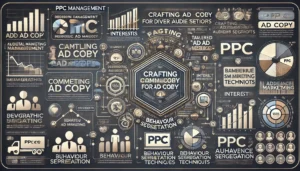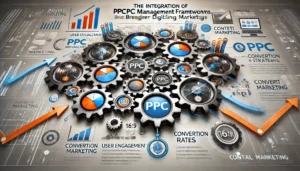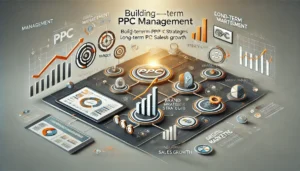PPC Management Frameworks Revealed: Driving Growth for Leading UK Enterprises

In the bustling world of UK enterprises, PPC management frameworks have become the backbone of successful digital marketing strategies. These frameworks are not just about placing ads; they’re about creating structured, data-driven approaches that align with business goals. As companies strive to capture the attention of their target audiences, understanding and implementing these frameworks can make all the difference. From crafting compelling ad copy to leveraging real-time data, UK businesses are finding innovative ways to optimise their PPC campaigns for growth.
Key Takeaways
- Structured PPC frameworks are essential for aligning campaigns with business goals.
- Data-driven strategies help refine PPC efforts and improve efficiency.
- Crafting engaging ad copy is crucial for reaching diverse audiences.
- Advanced targeting techniques enhance user experience and boost conversions.
- Integrating PPC with other digital marketing strategies leads to sustainable growth.
Understanding the Role of PPC Management Frameworks in UK Enterprises
The Importance of Structured PPC Campaigns
In the fast-paced world of digital marketing, having a structured approach to Pay-Per-Click (PPC) campaigns is vital. We recognise that without a clear framework, campaigns can quickly become chaotic and ineffective. Structured PPC campaigns provide a roadmap for consistent performance and measurable outcomes. By organising our campaigns in a systematic way, we ensure that each element is aligned with our overall marketing objectives.
How Frameworks Enhance PPC Efficiency (PPC Management Frameworks Revealed)
Frameworks aren’t just about keeping things tidy; they play a crucial role in boosting efficiency. With a solid framework, we’re able to streamline processes and reduce wasted effort. This means more time spent on what really matters—optimising ad performance and increasing return on investment. We can also quickly identify what’s working and what isn’t, allowing us to make swift adjustments. Additionally, frameworks facilitate better communication across teams, ensuring everyone is on the same page.
Aligning PPC Strategies with Business Goals
Aligning PPC strategies with our business goals is essential for success. We need to make sure that every click and every pound spent contributes to our larger objectives. This involves setting clear goals from the outset and continuously monitoring progress. By doing so, we can ensure that our PPC efforts are driving the desired outcomes, whether that’s increased sales, greater brand awareness, or improved customer engagement. For instance, by using Remarketing Lists for Search Ads, we can target users who have already shown interest, thus enhancing conversion rates and improving ROI.
PPC Management Frameworks Revealed: Leveraging Data-Driven Insights for PPC Success
Utilising Analytics to Refine PPC Strategies
In the world of PPC, data is king. We use analytics to shape our strategies, ensuring every decision is backed by solid evidence. Analytics transform raw numbers into actionable insights. By understanding metrics like click-through rates and conversion paths, we can tweak our campaigns for better performance. It’s not just about gathering data; it’s about knowing what to do with it.
- Identify key metrics relevant to your goals
- Track the customer journey with conversion data
- Use A/B testing to refine ads and landing pages
Embracing a data-driven approach means every pound spent is an investment towards success. With tools like Google ads audit, we can continually refine and improve.
Real-Time Data for Campaign Optimisation (PPC Management Frameworks Revealed)
Time waits for no one, especially in PPC. Real-time data is crucial for making quick adjustments that can save or earn money. By monitoring metrics as they happen, we can adjust bids, refine targeting, and ensure ad relevance. This agility allows us to respond to trends and patterns as they emerge.
- Monitor key performance indicators (KPIs) like CTR and CPA
- Adjust bids based on keyword performance
- Test different ad creatives to see what clicks
The goal is to convert clicks into meaningful actions. In London’s fast-paced market, staying responsive with real-time data gives us an edge.
Case Studies: Data-Driven PPC Success Stories
Looking at successful campaigns, especially in a bustling market like London, offers valuable lessons. Agencies often conduct a thorough Google ads audit to find strengths and weaknesses. This isn’t a one-time task but a continuous process of refinement.
- Review past performance to guide future strategies
- Pinpoint profitable keywords and placements
- Analyse conversion metrics and adjust accordingly
By partnering with expert PPC agencies, we can keep evolving our strategies. It’s about learning from the past and adapting for the future.
PPC Management Frameworks Revealed: Crafting Compelling Ad Copy for Diverse Audiences
Understanding Audience Segmentation
When it comes to crafting ad copy that truly resonates, understanding who you’re talking to is half the battle. We need to break down our audience into meaningful segments. This means looking at demographics, interests, and behaviours. It’s not just about age or location anymore; it’s about understanding their needs and how they interact with our brand. We should ask ourselves: what problems are they facing, and how can our product or service solve these issues? By identifying these segments, we can tailor our messages to speak directly to them.
Techniques for Engaging Ad Copy (PPC Management Frameworks Revealed)
Creating engaging ad copy is more than just putting words together. It’s about telling a story that captures attention and holds it. We need to focus on a few key elements:
- Clarity: Make sure your message is clear and concise. People should understand your offer in seconds.
- Emotion: Tap into the emotional side of your audience. Whether it’s excitement, curiosity, or urgency, emotions drive actions.
- Call to Action: Every piece of ad copy should have a strong call to action. Tell your audience exactly what you want them to do next.
The Role of Creativity in PPC Advertising
Creativity is the secret sauce in PPC advertising. It’s what makes an ad stand out in a sea of content. We need to think outside the box and experiment with different formats and styles. Use humour, surprise, or even a bit of controversy to grab attention. But remember, creativity should always align with our brand’s voice and message. It’s not just about being different; it’s about being memorable.
In the ever-evolving world of PPC, staying ahead requires a blend of data-driven strategies and creative flair. It’s this combination that turns clicks into customers and drives real growth.
PPC Management Frameworks Revealed: Innovative Approaches to PPC Targeting and Engagement
Advanced Targeting Techniques
In the world of PPC, the secret to success often lies in how well we can target our audience. Advanced targeting techniques allow us to hone in on the specific needs and desires of our potential customers. By using tools like negative keyword targeting, we can philtre out irrelevant traffic, ensuring our ads are seen by those truly interested in what we offer. It’s not just about reaching as many people as possible—it’s about reaching the right people.
- Utilise demographic data to refine audience segments
- Implement interest-based targeting to align ads with user preferences
- Regularly update and test ad formats to see what resonates
Enhancing User Experience in PPC (PPC Management Frameworks Revealed)
A seamless user experience (UX) is crucial for converting clicks into customers. When someone clicks on our ad, they should land on a page that is clear, engaging, and easy to navigate. This is where we can make or break a sale.
“A well-designed landing page is like a friendly guide, leading visitors effortlessly to the information or product they seek.”
To enhance UX, consider these elements:
- Clarity: Make sure your landing page matches the promise of your ad.
- Speed: Ensure pages load quickly to prevent potential customers from bouncing.
- Mobile Optimisation: With so many users on mobile, a responsive design is a must.
Maximising Conversions Through Engagement
Engagement is the bridge between interest and conversion. To maximise conversions, we need to keep our audience engaged from the first click to the final purchase. This involves crafting compelling ad copy, using retargeting strategies, and maintaining a consistent brand message.
Here are some strategies to boost engagement:
- Personalise ad content based on user behaviour.
- Use analytics to inform and adjust targeting decisions.
- Continuously optimise campaigns with real-time data.
By focusing on these areas, we’re not just increasing our conversion rates; we’re building lasting relationships with our customers. And in the ever-evolving landscape of PPC, these relationships are key to sustainable growth.
PPC Management Frameworks Revealed: Integrating PPC with Broader Digital Marketing Strategies
Synergy Between PPC and Content Marketing
When we think about the relationship between PPC and content marketing, it’s like two gears working together. Each one drives the other forward. Content marketing provides the substance that PPC promotes, drawing in potential customers. By aligning our PPC efforts with content marketing, we create a unified experience for users. This means consistent messaging across all platforms. We should aim to educate, inspire, or entertain through our content, leading to better engagement and higher conversion rates.
Leveraging Social Media for PPC (PPC Management Frameworks Revealed)
In today’s bustling digital scene, social media is a goldmine for PPC campaigns. Platforms like Facebook and Instagram offer us a treasure trove of user data. This allows us to refine our targeting with precision. By engaging with audiences where they spend most of their time, we can amplify our brand’s reach and foster meaningful interactions. Social media isn’t just about broadening our reach; it’s about creating a dialogue. We should use these platforms to gather feedback and build a community around our brand.
Email Marketing as a Supportive Tool
Email marketing is like a trusty sidekick to our PPC efforts. It enhances the impact of campaigns through precision and personalisation. By integrating email lists into our PPC strategies, we can tailor ads to match the preferences of our subscribers. This leads to higher engagement and conversion rates. Consider using segmentation to deliver targeted PPC ads to specific groups within your email list. Crafting email content that complements PPC ads can create a cohesive narrative, ensuring our message resonates with those who have shown interest in our brand.
By synthesising these elements, we create a robust ecosystem where each component supports the others, driving conversions and maximising ROI. Remember, the goal is to provide value that goes beyond the click. Our content should educate, inspire, or entertain, ultimately leading to a higher conversion rate.
PPC Management Frameworks Revealed: Adapting to Emerging PPC Trends and Technologies
Staying Ahead with the Latest PPC Innovations
In the fast-paced world of PPC, keeping up with the latest innovations is not just beneficial—it’s essential. Trends change rapidly, and what was effective yesterday might not work tomorrow. We need to be proactive, always on the lookout for new tools and platforms that can give us an edge. For instance, the rise of AI in PPC has been a game-changer. It helps us automate tasks, personalise ads, and optimise bids with unprecedented precision. This is especially true for ecommerce PPC, where competition is fierce and margins are thin.
The Impact of AI on PPC Campaigns (PPC Management Frameworks Revealed)
Artificial intelligence is reshaping how we approach PPC campaigns. From AI-driven keyword research to automated bidding strategies, the potential is enormous. We can now analyse vast amounts of data in real-time, allowing us to adjust our strategies on the fly. This means more efficient spending and better targeting. AI tools are also improving ad personalisation, making it easier to reach the right audience with the right message. As we adopt these technologies, we find that our campaigns become not only more effective but also more efficient.
Exploring New Ad Formats and Platforms
The digital landscape is constantly evolving, and so are the ad formats and platforms available to us. Vertical videos, interactive ads, and augmented reality experiences are just a few examples of the new formats we can explore. Each offers unique opportunities to engage with our audience in fresh ways. Additionally, platforms like TikTok and Snapchat are becoming increasingly important for reaching younger demographics. By experimenting with these new formats and platforms, we can discover what resonates most with our audience and refine our approach accordingly.
Embracing change in PPC isn’t just about keeping up—it’s about staying ahead. By integrating the latest trends and technologies into our strategies, we ensure our campaigns are not only relevant but also impactful. As we continue to innovate, we maintain our competitive edge in the ever-evolving digital marketplace.
PPC Management Frameworks Revealed: Building Long-Term PPC Strategies for Sustainable Growth
Setting Clear Objectives for PPC Success
When it comes to crafting a PPC management strategy that stands the test of time, setting clear objectives is our starting point. We need to know exactly what we want to achieve with our campaigns. Are we looking to boost brand awareness, drive traffic, or increase sales? Each goal requires a different approach, and understanding this helps us tailor our strategies effectively. Defining these objectives early on provides a roadmap for our PPC efforts, ensuring every action aligns with our broader business goals.
Continuous Improvement and Adaptation (PPC Management Frameworks Revealed)
In the world of PPC, resting on our laurels is not an option. The digital landscape is constantly shifting, and so must our strategies. We regularly review performance metrics, analyse trends, and adapt our tactics to meet changing market demands. This ongoing cycle of improvement ensures that our campaigns remain effective and competitive. We embrace a mindset of learning and innovation, always on the lookout for new opportunities to refine our approach.
Partnering with Expert PPC Agencies
Sometimes, navigating the complexities of PPC can feel overwhelming. That’s where expert agencies come in. By partnering with a leading PPC management agency, we gain access to specialised knowledge and resources that can elevate our campaigns to new heights. These agencies bring a wealth of experience, offering insights that might not be immediately apparent to us. Collaborating with them allows us to focus on our core business activities while they handle the intricacies of our PPC efforts. This partnership is not just about outsourcing tasks; it’s about building a strategic alliance that drives sustainable growth.
By aligning our PPC strategies with our business goals, continuously adapting to changes, and leveraging the expertise of specialised agencies, we create a robust framework for long-term success. This approach not only meets our current needs but also positions us for future growth in the competitive UK market.
PPC Management Frameworks Revealed: Evaluating Top PPC Agencies for Strategic Partnerships
Key Criteria for Selecting a PPC Partner
When we’re looking for the perfect PPC agency, it’s important to weigh several factors. We need a partner who excels in pay-per-click advertising and understands our specific market niche. A PPC ecommerce agency with a track record in areas like eCommerce marketing, Amazon ads, and feed optimisation can elevate our business. It’s not just about managing ads; it’s about a partnership that aligns with our business goals.
Here’s a checklist to guide our selection:
- Industry Expertise: Does the agency understand our industry and its unique challenges?
- Portfolio of Success: Can they show successful campaigns with measurable results?
- Transparent Communication: Do they offer regular updates and reports?
- Budget Management: Are they strategic in maximising ROI?
Benefits of Working with Experienced Agencies (PPC Management Frameworks Revealed)
Partnering with an experienced PPC agency is like gaining a strategic ally. Their insights can turn a good campaign into a great one. Agencies with a history across various sectors bring knowledge from consumer goods to automotive industries. This experience allows for tailored campaigns that connect with our audience.
Consider these benefits:
- Access to a team with a wide skill set
- Fresh perspectives to revitalise marketing strategies
- Time and resource savings
By leveraging local insights, our campaigns can connect deeper with the audience, fostering trust and driving conversions.
Case Studies: Successful Agency Collaborations
Exploring successful collaborations helps us understand the potential of partnering with the right agency. Real case studies show how agencies have helped businesses like ours thrive in the competitive digital landscape. Look for agencies that offer comprehensive case studies or client success stories.
In our search, we should ask:
- Do they offer a free audit of our current PPC performance?
- Can they provide detailed case studies?
- Are they recognised with industry awards?
By focusing on these aspects, we’ll be equipped to choose a PPC partner that helps our business thrive. Explore five effective strategies for scaling your business to see how specialised PPC services can enhance your advertising performance.
The Future of PPC Management Frameworks in the UK
Predicting Trends in PPC Management
As we look to the future of PPC management, it’s clear that automation and personalisation will play pivotal roles. The use of AI in creating ad content and optimising campaigns is no longer just a novelty—it’s becoming the norm. We need to stay on top of these trends to maintain our competitive edge. Automation tools are helping us manage large-scale campaigns more efficiently, allowing us to focus on strategy rather than mundane tasks. We must also keep an eye on how personalisation can enhance user engagement, tailoring ads to individual preferences and behaviours. This means investing in data analytics tools that help us understand our audience better.
Preparing for Future Challenges in PPC (PPC Management Frameworks Revealed)
The landscape of PPC is ever-changing, and with it comes a set of new challenges. Ad blockers, privacy concerns, and evolving consumer behaviours are just a few hurdles we might face. To tackle these, we must be proactive in our approach. Regular updates and training sessions can ensure we’re using the latest tools and techniques. It’s also crucial to foster a culture of adaptability within our teams, encouraging innovation and experimentation. By doing so, we can anticipate changes and adjust our strategies accordingly.
Innovations Shaping the Future of PPC
Innovation is at the heart of PPC’s future. From new ad formats to platforms that weren’t even on our radar a few years ago, the possibilities are endless. Vertical videos and interactive ads are gaining traction, offering fresh ways to capture audience attention. We should not shy away from experimenting with these formats to see what resonates best with our audience. Additionally, the integration of PPC with other digital marketing strategies, like content marketing and social media, is becoming increasingly important. By creating a cohesive strategy, we can maximise our reach and impact.
As we move forward, let’s remember that staying ahead in the PPC game means embracing change and being open to new ideas. The tools and strategies we use today might be obsolete tomorrow, so continuous learning and adaptation are key.
In conclusion, the future of PPC management in the UK is bright and full of potential. By embracing trends, preparing for challenges, and fostering innovation, we can ensure our strategies remain effective and impactful.
As we look ahead, the landscape of PPC management in the UK is set to evolve significantly. Businesses must adapt to new strategies and technologies to stay competitive. If you’re ready to enhance your PPC efforts, visit our website for a free review of your ads performance today!
Conclusion
In wrapping up our exploration of PPC management frameworks that are propelling growth for top UK enterprises, it’s evident that a thoughtful blend of strategy, data, and creativity is key. These frameworks aren’t just about picking the right keywords or setting up ads; they’re about understanding the bigger picture. By continuously refining strategies and staying updated with the latest industry trends, businesses can ensure their PPC efforts are not just effective but also sustainable. Partnering with seasoned PPC agencies can provide the insights and expertise needed to navigate this complex landscape. As the digital world continues to evolve, those who adapt and innovate will undoubtedly lead the charge in achieving remarkable growth.
Frequently Asked Questions
What is PPC and why is it important for businesses?
PPC, or Pay-Per-Click, is an online advertising method where businesses pay each time a user clicks on their ad. It’s important because it helps businesses quickly reach potential customers and drive traffic to their websites.
How can PPC advertising benefit my business?
PPC advertising can increase your brand’s visibility, drive targeted traffic to your website, and boost sales by reaching potential customers who are searching for products or services like yours.
What are some key components of a successful PPC campaign?
A successful PPC campaign includes well-researched keywords, compelling ad copy, a clear call-to-action, and continuous monitoring and optimisation to improve performance.
How do I choose the right keywords for my PPC campaign?
Choosing the right keywords involves researching what terms potential customers use when searching for products or services like yours. Tools like Google’s Keyword Planner can help identify effective keywords.
Why is it important to have a clear call-to-action in PPC ads?
A clear call-to-action (CTA) tells users what you want them to do next, such as “buy now” or “learn more.” It encourages users to take action, which can lead to higher conversion rates.
How does PPC fit into a broader digital marketing strategy?
PPC complements other digital marketing efforts like SEO, content marketing, and social media by driving immediate traffic and providing data insights that can enhance overall strategy.
What should I look for when choosing a PPC agency?
When choosing a PPC agency, look for experience, a proven track record, transparency in reporting, and a clear understanding of your business goals and target audience.
How can I measure the success of my PPC campaigns?
The success of a PPC campaign can be measured by tracking metrics such as click-through rate (CTR), conversion rate, cost per click (CPC), and return on ad spend (ROAS). These metrics help evaluate the effectiveness of your campaign.
Author
Search Blog
Free PPC Audit
Subscribe to our Newsletter
The Voices of Our Success: Your Words, Our Pride
Don't just take our word for it. With over 100+ five-star reviews, we let our work-and our satisfied clients-speak for us.
"We have been working with PPC Geeks for around 6 months and have found Mark and the team to be very impressive. Having worked with a few companies in this and similar sectors, I rate PPC Geeks as the strongest I have come across. They have taken time to understand our business, our market and competitors and supported us to devise a strategy to generate business. I value the expertise Mark and his team provide and trust them to make the best recommendations for the long-term."
~ Just Go, Alasdair Anderson




